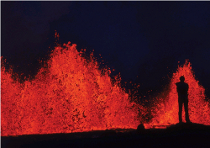3 Ways to Protect Yourself from Events like the Iceland Volcano

For the last 5 days, a cloud of volcanic ash from a volcano in Iceland has covered much of Europe. Because this ash is so dangerous to jets, air travel across Northern Europe has virtually ground to a halt. Consequently, hundreds of thousands of people are stranded in airports around the world and airlines are loosing hundreds of millions of dollars per day.
On the news, many passengers are heard complaining that they are out of money and completely stranded. Those in Europe who do have money have hopped on trains, ferries or have paid thousands of dollars to ride for hours in taxis to get home. This is a very unfortunate situation that few people could have anticipated. It is impacting the finances of millions as businesses that rely on European travel are particularly hard hit. What could anyone have done to protect themselves from something like this? Here are three steps we think people can take to minimize the inconvenience of events like this.
1. Establish an emergency savings account
As the volcanic ash covering Europe shows, bad things happen. We usually don’t know what will happen, but we can prepare for emergencies by putting aside some money to help us survive the unexpected. You can start with as little as a few hundred dollars then work up to a thousand dollars. Eventually, it is ideal to have anywhere from a month to three months worth of income saved (in case you lose your job), but start with a few hundred dollars and then work up as you can afford to put money aside.
2. Pay off your credit cards
Unfortunately, a lot of people who were vacationing in Europe probably maxed out their credit cards with the expectation that they would soon be back at work and would be able to start getting things paid down. Unfortunately, this volcano seems to have caught a lot of people by off guard and now they have to sleep at the airport because they can’t afford to go anywhere else.
Just like pilots always make sure they have extra fuel for emergencies, so we should also make sure that we always have extra room on our credit cards for emergencies—especially when traveling. You are probably already working on this, but one of the best things you can do to prepare for emergencies is completely pay off your credit cards and not carry balances. If you would like more tips on how to pay off debt, click here.
3. Avoid volcanoes
Based on what we are seeing in the news, it would seem to be a good idea to stay away from volcanoes, but much more common than natural volcanoes are the financial volcanoes that erupt in people’s lives when emergencies happen. You can’t always avoid natural disasters, but you can avoid personal financial disasters. Count on the unexpected happening at some point in time, and protect yourself by planning ahead. Emergency savings and paying down debt are the first steps, but then look at your life style and the priorities you have for your finances. Living and spending within your means will protect you from both natural and personal financial disasters.
